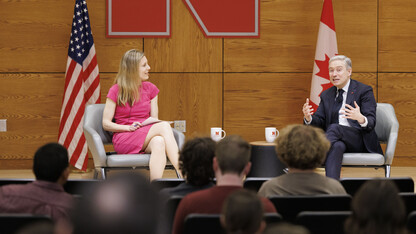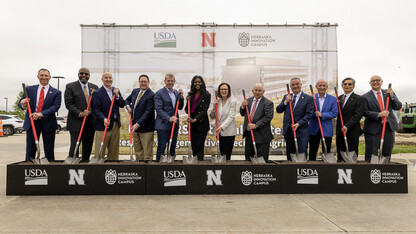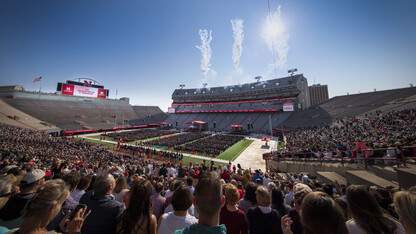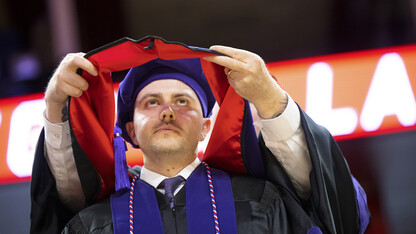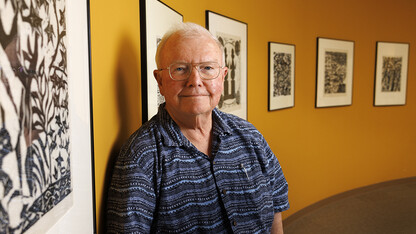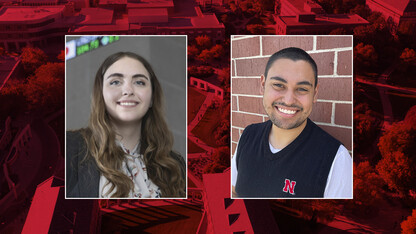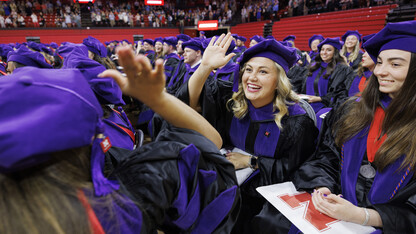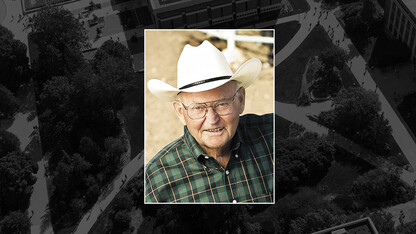· 10 min read
Nebraska in the national news: August 2022

A Husker engineer’s invention generated buzz in national and international media outlets in August. The stories were among 50-plus featuring Husker faculty, staff, students, centers and programs during the month.
A miniaturized surgical robot invented by Shane Farritor, Lederer Professor of engineering and co-founder of Virtual Incision, will be tested aboard the International Space Station in 2024.
NASA recently awarded the university $100,000 through the Established Program to Stimulate Competitive Research to ready the robot known as MIRA (“miniaturized in vivo robotic assistant”) for the autonomous test mission.
“NASA has been a long-term supporter of this research and, as a culmination of that effort, our robot will have a chance to fly on the International Space Station,” Farritor said.
Stories on the test mission have appeared in 160-plus media outlets, including CNET, Cosmos, The Daily Beast, the Daily Mail, Digital Trends, Gizmodo, MSN.com, PC Magazine, Space.com, the Telegraph, United Press International, the U.S. Sun and Yahoo! News.
More coverage:
David Wilson, professor emeritus of teaching, learning and teacher education, wrote about his longtime friendship with an Afghan man named Jabar for an Aug. 2 Guardian article. The two met when they were both teaching at a Kandahar school in the late 1970s. Wilson helped Jabar’s daughter and her husband relocate to Lincoln when the Taliban returned to power in Afghanistan in 2021.
A recent University of Nebraska–Lincoln study was featured in an Aug. 2 Drovers article on intensive or “mob” grazing. Bianca Andrade, Walter Schacht and colleagues found that mob grazing led to the trampling of nearly 50% of standing plants, twice that of conventional four-pasture rotations, yet the researchers found no meaningful difference in the subsequent production, composition or root growth of pasture plants. The team concluded that the benefits of trampling are, if anything, limited, and that the added labor of mob grazing might far outweigh the benefits for many operations.
Ed Cahoon, biochemistry, director of the Center for Plant Science Innovation, and colleagues are researching vegetable oils that have the potential to become environmentally friendly bioproducts. Phys.org ran an Aug. 3 article on the research.
Ismail Dweikat, agronomy and horticulture, was featured in an Aug. 3 Brownfield Ag News story. He said diversifying crop rotations with hemp can increase a producer’s bottom line if there’s access to markets. He said hemp can be more profitable than corn or soybeans, but processing and marketing the crop can be a struggle.
The Nebraska Integrated Beefs Systems (NIBS) hub has been renamed Beef Innovation, the Rural Radio Network and Farms.com reported. Beef Innovation is an interdisciplinary effort to bring together Husker faculty, staff and students working to improve the efficiency, resilience and profitability of beef production. Galen Erickson, animal science, a leader of the program, was quoted in the story.
Al Dutcher, Nebraska’s associate state climatologist and associate geoscientist with the survey division of the School of Natural Resources, was interviewed for an Aug. 4 Brownfield Ag News story on how weather challenges, such as drought and high winds, might affect crop production. He said it remains to be seen how much of the U.S. corn crop will be impacted by weather this year but that the eastern Corn Belt should offset losses in the Great Plains.
Chancellor Ronnie Green was featured in an Aug. 5 Brownfield Ag News story. He said with a national agricultural labor shortage, there has been an increase in students enrolling in ag-related majors since 2012. He emphasized the university’s N2025 goal that each student have at least one paid internship, international experience and research experience with faculty by the time they graduate.
Rural Prosperity Nebraska helped the village of Emerson form a grocery cooperative. The Sioux City Journal published an Aug. 6 article on the village’s new grocery store. Charlotte Narjes, Rural Prosperity Nebraska extension educator, was interviewed for the story.
A 2020 study on biochar by Husker student Ryley Thomas, under the supervision of Michael Kaiser and Jennifer Cooper, both agronomy and horticulture, was highlighted in an Aug. 8 Missouri Independent article. The study showed that adding biochar to soil significantly reduced the amount of lead taken up by lettuce planted in it. Thomas and Kaiser were interviewed for the story, which was picked up by several media outlets, including NPR’s Science Friday.
Charles Stoltenow, dean and director of Nebraska Extension, was interviewed for an Aug. 9 segment on Brownfield Ag News. He discussed his vision for growing extension by helping ag producers in the state.
A study by Allison Cipriano, a doctoral student in psychology, and colleagues was featured in an Aug. 9 Science article on a proposed set of changes to Title IX that would make most university employees “mandatory reporters” of any alleged sexual misconduct involving students they become aware of. The researchers reported that targets of sexual harassment may go to trusted faculty members for reasons other than to trigger a formal investigation and that many students aren’t aware their institutions have mandatory reporting policies.
Kate Brooks, agricultural economics, was interviewed for an Aug. 9 segment on RFD-TV. She discussed a recent report by her department showing the ethanol industry’s economic impact on Nebraska.
James F. Tierney, law, was quoted in an Aug. 10 Mother Jones article on Coinbase’s decision to stop some email notifications amid a dramatic cryptocurrency crash earlier this year. Tierney said increased push notifications can harm investors. “Ordinary people often don’t benefit from having our attention drawn to trading,” he said. Research, he pointed out, shows unsophisticated investors often undermine their own portfolios by trading frequently, instead of holding investments for long periods.
The U.S. Drought Monitor — produced jointly by the university’s National Drought Mitigation Center, the National Oceanic and Atmospheric Administration and the U.S. Department of Agriculture — was highlighted in an Aug. 12 analysis by Philip Bump in The Washington Post.
Lily Cooper of Aurora, Colorado, is among 43 first-year students in the Nebraska Business Honors Academy at Nebraska this fall, Patch.com reported Aug. 12.
Husker football student-athlete Decoldest Crawford stars in a new advertisement for Omaha’s SOS Heating and Cooling. Stories on the name, image and likeness deal appeared in KOLN/KGIN, Bleacher Report, CBS Sports, ESPN, FOX News, the New York Post, Sporting News, Sports Illustrated, USA Today and 70-plus other media outlets.
Kenneth Kiewra, educational psychology, co-wrote an Aug. 17 guest column for The Chronicle of Higher Education titled “How to be a productive scholar” with the University of Regensburg’s Linlin Luo and Georgia Southern’s Abraham Flanigan. The column featured advice from a recent study in which the researchers interviewed six academics whose work had won early-career awards from the American Educational Research Association or American Psychological Association.
Judy Wu-Smart, entomology, was featured Aug. 17 in a profile on the U.S. Department of Agriculture’s National Institute of Food and Agriculture blog. She discussed how she became interested in agriculture and her involvement with NIFA, and offered advice for students who might want to pursue a similar career path.
Patrice McMahon, political science, director of the University Honors Program, was interviewed for an Aug. 18 article in The Conversation. She shared her observations on how Poland is responding to the arrival of about 2 million Ukrainian refugees. She spent five weeks in Poland this summer conducting on-the-ground research. The story was picked up by 20-plus media outlets, including MSN.com and Yahoo! News.
Karl Reinhard, School of Natural Resources, was quoted in an Aug. 18 Science article on a new University of Cambridge study suggesting that medieval friars were riddled with parasites and that their gardening practices may have been to blame. Reinhard said that many eggs the research team examined lack the protective casings common in roundworms. “There are many oval structures in the fungal and botanical worlds that can be parasite egg fakers in archaeological contexts,” he said.
A new study co-authored by Husker biochemists has upended decades of doctrine about an enzyme whose mutation or malfunction can trigger fatal diseases early in life, Phys.org reported Aug. 18. The research team included Oleh Khalimonchuk, biochemistry; Jonathan Dietz, graduate student in biochemistry; and Javier Seravalli, research associate professor in biochemistry.
Beef magazine published an Aug. 18 article on Marble Technologies, a startup based at Nebraska Innovation Campus. The company aims to create a more efficient and safer food supply by incorporating automation into meatpacking plants. Chafik Barbar, the company’s CEO, was interviewed for the story.
Eileen Hebets, biological sciences, was interviewed for an Aug. 22 CNN story on actor and musician Will Smith’s Instagram video of a tarantula found in his house. Hebets praised the celebrity’s removal of the spider on Twitter. “LOVE the care that is taken with this #spider (likely an Aphonopelma) to remove it gently and safely,” she tweeted. She told CNN that most tarantulas are “not dangerous at all.”
Husker researchers are studying how to make ethanol production more environmentally sensitive by reducing the amount of water and energy required to produce it and cutting the air emissions that result, Biofuels Digest reported Aug. 22. The Nebraska Environmental Trust is helping fund the research with $155,663 this year and $44,232 in a second year. Bruce Dvorak, professor of civil and environmental engineering, is the principal investigator for the grant.
Karen St. Germain, director of NASA’s Earth Science Division, discussed the agency’s Space for Ag initiative during an Aug. 22 Heuermann Lecture at the university. As part of a corresponding tour, St. Germain and other NASA officials visited with ag producers near Mead, Giltner and Lexington Aug. 22 and 23. Stories on the tour appeared in at least eight Nebraska media outlets, including the Omaha World-Herald, as well as DTN Progressive Farmer.
Eric Berger, law, was quoted in an Aug. 22 Marketplace story on the controversy surrounding recent changes to a federal debt relief program for farmers of color. He said the new relief program should hold up better in court “because race has been removed from the face of the policy. And this Supreme Court has made clear that it does not approve of racial preferences.”
The Railroads and the Making of Modern America project at Nebraska was highlighted in FiveThirtyEight’s Data is Plural newsletter on Aug. 24. The project was cited in a July 15 Broadstreet article on Democratic presidential candidate William Jennings Bryan’s whistle-stop tour in 1896. The project has compiled a table of Bryan’s itineraries, listing each event’s date and location and linking to many of the speeches.
Deborah Bathke, a climatologist with the National Drought Mitigation Center, discussed how communication outages impacted the Aug. 25 U.S. Drought Monitor for an Aug. 26 RFD-TV story.
S. Carolina Córdova, agronomy and horticulture, was the featured guest on the Wisconsin Energy Institute’s Propelling Women in Power podcast on Aug. 25. She discussed her path to becoming a leader in the soil sciences and her hands-on approach to mentorship.
John Hibbing, political science, was interviewed for an Aug. 27 article in The Hill on Nebraska’s 1st Congressional District race between Republican Mike Flood and Democrat Patty Pansing Brooks. Hibbing said that while Lincoln is growing — helping Democrats, who do better in urban areas — overcoming GOP dominance in rural parts of the district is “too high a hill to climb right now.” The article was picked up by more than a dozen media outlets.
Dawn O. Braithwaite, Willa Cather Professor of Communication Studies Emerita, wrote an Aug. 29 blog post for Psychology Today titled “When family estrangement is the healthiest choice.” She emphasized that for some people, cutting off communication permanently is the best path forward, though it can be challenging to explain to others.
Faculty, administration, student and staff appearances in the national media are logged at http://newsroom.unl.edu/inthenews. If you have additions to the list, contact Sean Hagewood at shagewood2@unl.edu or 402-472-8514. If you have suggestions for national news stories, contact Leslie Reed at lreed5@unl.edu or 402-472-2059.
